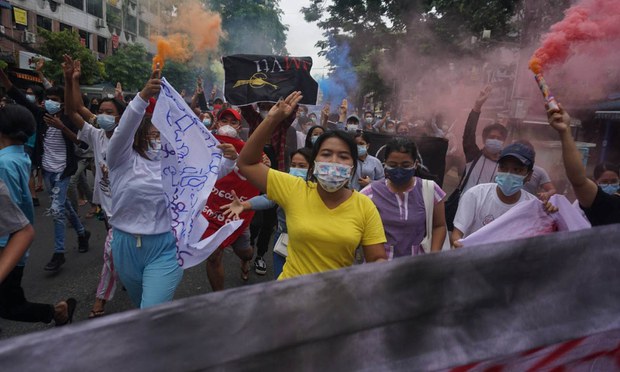Hundreds March in Myanmar to Honor Protesters Killed in a 1962 Massacre and to Oppose Today’s Junta


Protesters march in Yangon to demand an end to military rule on the anniversary of a 1962 massacre of students by Myanmar’s military, July 7, 2021.
By RFA
Myanmar’s young will continue the fight against military rule so that future generations will not suffer as they have, marchers say.
Hundreds of young people turned out in cities across Myanmar on Wednesday to mark the anniversary of a 1962 student uprising against a military coup, calling on citizens to continue the decades-long struggle against the army, which again overthrew civilian rule in February.
The July 7, 1962 protest in Myanmar’s then-capital Yangon led to the massacre by the army of more than 100 students, providing a model of sacrifice and resistance to this year’s Feb. 1 coup that ousted the civilian government of Aung San Suu Kyi’s National League for Democracy, marchers said on Wednesday.
Military forces overthrew Aung San Suu Kyi’s elected government based on accusations that November 2020 landslide elections won by Aung San Suu Kyi’s National League for Democracy (NLD) were marred by voter fraud.
The junta, which has not produced evidence of fraudulent elections, has led a violent crackdown on protesters opposed to its rule that has killed 900 people.
“Today, July 7, is the day when students started the first uprising against the military dictatorship in Myanmar when Ne Win took power in 1962,” Maung Seint, one of Wednesday’s protesters, said in Yangon, where around 100 young people marched holding banners calling for the return of civilian rule.
“It can be said that today’s situation is very similar to the situation then. They had student protests following a military coup, and today we students are taking to the streets against a coup,” Maung Seint said.
“In the spirit of July 7, 1962, we are taking to the streets to continue the fight,” he said.
Security was tight in Yangon, with soldiers and police checking roads in the early morning, and the protest lasted only a few minutes. No one was arrested, Maung Seint said, contradicting reports from other sources that several people had been taken into custody.
In Myanmar’s second-largest city Mandalay, more than 100 students took part in a march. And in Sagaing region’s Monywa city—where many young people were arrested or shot, and others killed, by soldiers and police in recent protests—marchers also held a protest to commemorate the July 7, 1962 massacre.
As in Yangon, soldiers and police patrolled the city’s streets, but the march proceeded peacefully.
‘We are determined to oppose the coup’
Khant Wai Phyo, a Monywa student who took part in the rally, said the young people of Myanmar reject military rule and will continue to fight against it.
“For generations, young people in our country have never bowed down to injustice, and we rebel against it in any way that we can. In the same spirit, we cannot accept a coup d’etat in this country for any reason at all,” he said.
“We, the youth, are determined to oppose the coup till the very end,” he said.
Writing on social media from an undisclosed location on July 7, Myanmar’s shadow National Unity Government (NUG) praised the spirit of the country’s young who had fought in 1962 for “truth and justice” and are continuing the struggle in the present day, the opposition group said.
In Yangon, Min Han Htet—president of the city’s Dagon University Students’ Union—said strong efforts must now be made to overthrow the military junta that took power in Myanmar on Feb. 1.
“We have to make a strong commitment this July,” he said.
“If we don’t eradicate this 60-year-old dictatorship now, we can’t imagine how many more years it may remain in our land. We don’t want future generations to suffer like we have,” he said.
The U.S. Embassy in Myanmar writing in a statement Wednesday said, “The people of Myanmar have long strived for freedom, democracy, and peace. We honor all those who died on July 7, 1962, as well as the hundreds killed since February 1 who sought a return to democracy and the right to exercise their basic fundamental freedoms.”
At the UN Human Rights Council in Geneva, UN Special Rapporteur on the situation of human rights in Myanmar, Tom Andrews, called for an “Emergency Coalition for the People of Myanmar“ to be swiftly set up to stop what he described as the military junta’s “reign of terror” in the country of 54 million people.
“The international community is failing the people of Myanmar,” he said.
Andrews’ proposed coalition would include “nations willing to stand with the people of Myanmar through meaningful, coordinated action,” he said.
“It could reduce the junta’s ability to attack its citizens, save the lives of those in acute crisis, and gain political leverage so that the crisis in Myanmar might come to a just and permanent conclusion.”
Reported by RFA’s Myanmar Service. Translated by Khin Maung Nyane. Written in English by Richard Finney.
Original Post: RFA

